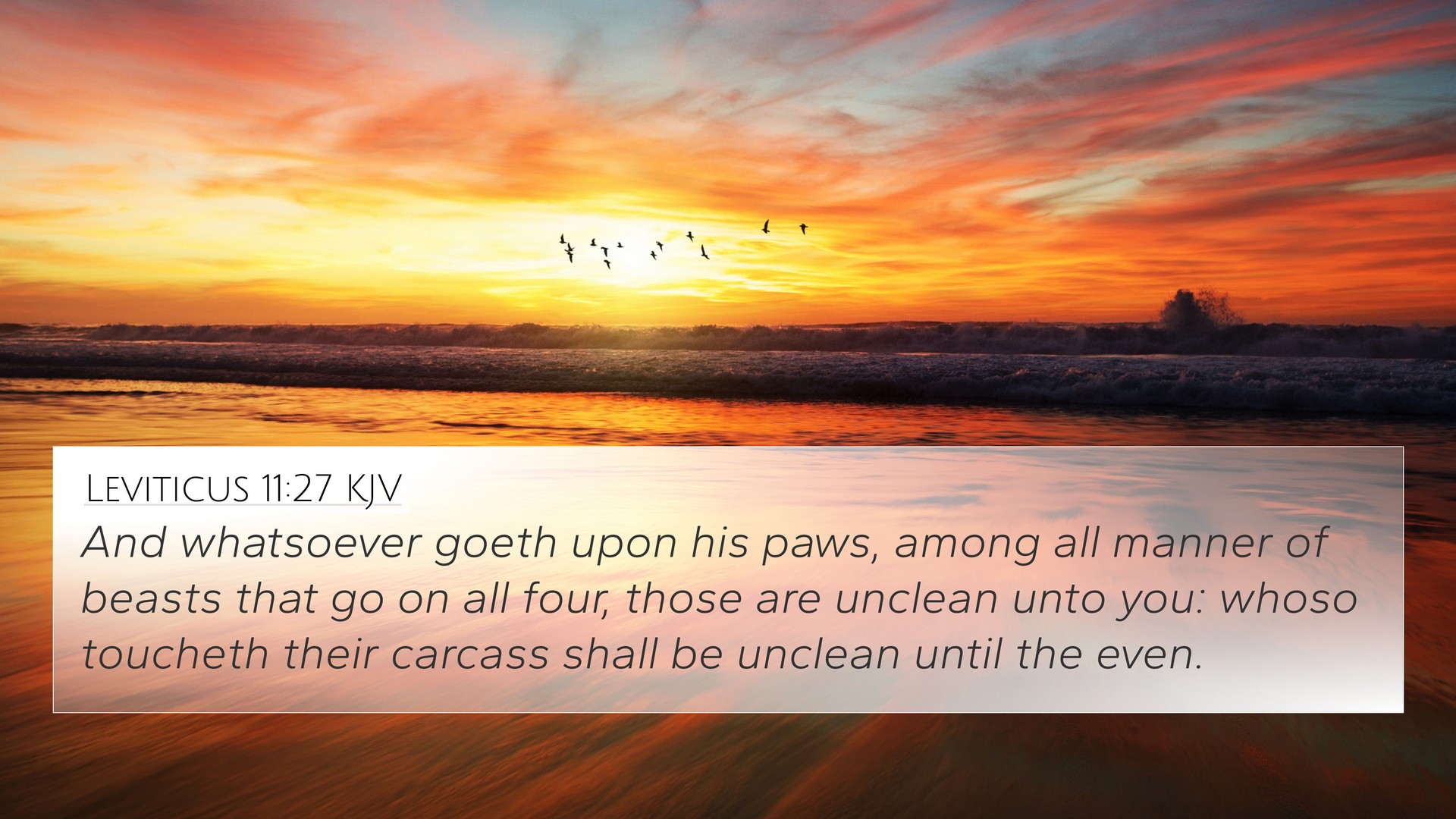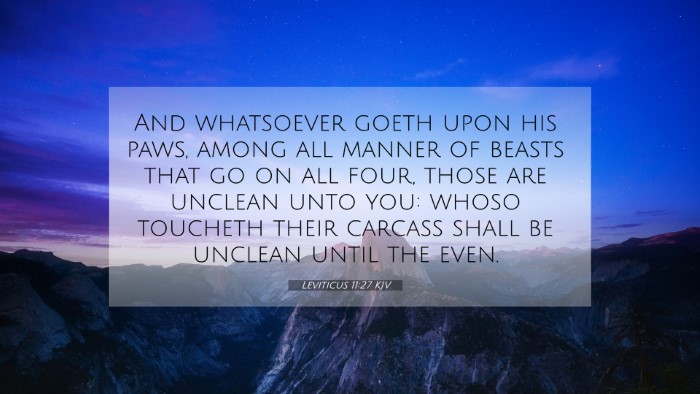Understanding Leviticus 11:27
Leviticus 11:27 states, "And whatsoever goeth upon his paws, among all manner of beasts that go on all fours, those are unclean unto you: whosoever toucheth their carcass shall be unclean until the even." This verse forms part of the dietary laws given to the Israelites, outlining which animals are considered clean and unclean for consumption.
The passage emphasizes the importance of ritual cleanliness and distinguishes between clean and unclean animals based on their characteristics, which is essential in maintaining holiness within the community.
Commentary Insights
According to Matthew Henry, the laws about clean and unclean animals serve not only practical dietary purposes but also spiritual symbolism, reminding the Israelites of their distinct status as God's chosen people. The emphasis on cleanliness suggests a deeper moral and ceremonial purity that God desires from His followers.
Albert Barnes expands on this, stating that the act of touching the carcass of an unclean animal rendered a person ceremonially unclean, requiring a period of purification. This ritual uncleanliness serves as a metaphor for spiritual contamination, illustrating how sin can affect one's relationship with God.
Adam Clarke highlights the ceremonial nature of these laws. He notes that the divisions of clean and unclean animals reflect God's holiness and the necessity for His people to approach Him with purity. Such distinctions foster a sense of discipline and reverence among the faithful.
Connections Between Bible Verses
Leviticus 11:27 has several cross-references that deepen the understanding of its message:
- Deuteronomy 14:7-8 - Similar dietary laws prohibiting the consumption of certain animals.
- Isaiah 66:17 - A prophetic warning against unclean practices.
- Mark 7:19 - New Testament perspective on cleanliness and dietary restrictions.
- 1 Peter 1:16 - Call to holiness based on God's holiness as a theme rooted in Leviticus.
- Hebrews 10:22 - An exhortation to draw near to God with a pure heart, reflecting the spirit of cleanliness.
- Matthew 5:8 - Beatitude emphasizing the purity of heart.
- Romans 14:14 - Paul discusses the idea of clean and unclean in the context of faith and holiness.
Thematic Bible Verse Connections
The themes of cleanliness, holiness, and the distinction between God's people and the world are prominent not only in Leviticus but throughout Scripture. These connections are vital for understanding the nature of sin and the call to live a life set apart for God.
Cross-referencing this verse with others helps to illuminate the comprehensive Biblical narrative regarding purity and makes clear how these laws resonate with New Testament teachings. As believers engage in cross-referencing Bible study methods, they discover profound insights hidden within the scriptures linking their faith across the Testaments.
Tools for Bible Cross-Referencing
Utilizing a Bible concordance or a cross-reference guide can greatly assist in uncovering the connections between various Bible verses. Here are some effective tools:
- Bible Concordance: A comprehensive list of words and their occurrences throughout the Bible.
- Digital Bible Study Tools: Many online platforms offer interactive cross-referencing features.
- Study Bibles: Often included notes and cross-references that provide insights alongside Biblical texts.
Comparative Bible Verse Analysis
Engaging in a comparative analysis of Leviticus 11:27 with the verses mentioned allows for a richer understanding of God's expectations for His people. By identifying how these themes translate from Old to New Testament, one can see the continuity of God's message concerning holiness and purity.
Conclusion
The study of Leviticus 11:27 is not merely an exploration of ancient dietary laws but a deeper reflection on what it means to be consecrated unto the Lord. Through biblical cross-referencing and thematic connections, believers can draw essential principles for living a life that honors God, deepening their understanding of Scripture in its entirety.




